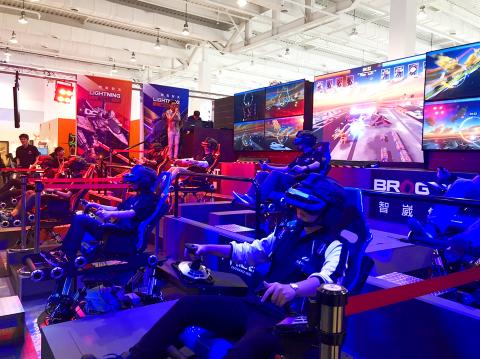Brogent Technologies Inc (智崴資訊), a manufacturer of theme park rides and flying theaters, is looking to tap the virtual reality (VR) e-sports market by leveraging its expertise in building 4D motion simulation systems.
The company last week unveiled Lightning Wings (閃電對決), its new competitive gaming title where players don VR headsets and pilot giant robots in battle.
Players must also wrestle with simulated motion feedback as their virtual cockpits heave and yaw with each maneuver in heated combat.

Photo courtesy of Brogent Technologies Inc.
Compared with sport titles with keyboard-and-mouse controls, the combination of VR and 4D motion simulation makes a much more compelling spectator sport experience, Brogent chief executive officer C.H. Ouyang (歐陽志宏) told an investors’ conference in Taipei.
“We’ve had a captive audience during a Lightning Wings tournament held at the Vision Get Wild exhibition in Kaohsiung last week,” Ouyang said.
“Much like the leap from feature phones to smartphones, we believe that VR and motion simulation is the future of e-sports.” Ouyang said, adding that the company would continue to seek partnerships to develop more titles and e-sports events to create monetization opportunities.
Ouyang was upbeat on earnings this year, as the company expands its flying theater offerings.
While the company has achieved market dominance with i-Ride, its premium flying theater system, Brogent is planning to launch m-Ride, a more accessible variant at half the price before the end of this year, Ouyang said.
He said that m-Ride takes only eight months to set up and is designed to be portable and suitable for short-term installations, such as exhibitions, while i-Ride takes 14 months to set up and requires 15m-high venues.
Despite its lower pricing, m-Ride installations are still expected to maintain favorable margins of 20 percent, Ouyang said, adding that its top-of-the line i-Ride costing between US$5 million and US$20 million per facility accounted for 90 percent of total sales as of the end of the first quarter this year.
The company, which has sold 29 ride installations to theme parks around the globe, expects to see significant growth in recurring revenue from content licensing and maintenance as it sets up its 100th installation in the next three to five years, he said.
Brogent reported that net income in the first three months dipped 15 percent annually to NT$37.98 million (US$1.27 million) due to higher research and development costs and foreign exchange losses. Earnings per share were NT$0.86.
Sales during the period rose nearly 10 percent annually to NT$350 million.

The US dollar was trading at NT$29.7 at 10am today on the Taipei Foreign Exchange, as the New Taiwan dollar gained NT$1.364 from the previous close last week. The NT dollar continued to rise today, after surging 3.07 percent on Friday. After opening at NT$30.91, the NT dollar gained more than NT$1 in just 15 minutes, briefly passing the NT$30 mark. Before the US Department of the Treasury's semi-annual currency report came out, expectations that the NT dollar would keep rising were already building. The NT dollar on Friday closed at NT$31.064, up by NT$0.953 — a 3.07 percent single-day gain. Today,

‘SHORT TERM’: The local currency would likely remain strong in the near term, driven by anticipated US trade pressure, capital inflows and expectations of a US Fed rate cut The US dollar is expected to fall below NT$30 in the near term, as traders anticipate increased pressure from Washington for Taiwan to allow the New Taiwan dollar to appreciate, Cathay United Bank (國泰世華銀行) chief economist Lin Chi-chao (林啟超) said. Following a sharp drop in the greenback against the NT dollar on Friday, Lin told the Central News Agency that the local currency is likely to remain strong in the short term, driven in part by market psychology surrounding anticipated US policy pressure. On Friday, the US dollar fell NT$0.953, or 3.07 percent, closing at NT$31.064 — its lowest level since Jan.

The New Taiwan dollar and Taiwanese stocks surged on signs that trade tensions between the world’s top two economies might start easing and as US tech earnings boosted the outlook of the nation’s semiconductor exports. The NT dollar strengthened as much as 3.8 percent versus the US dollar to 30.815, the biggest intraday gain since January 2011, closing at NT$31.064. The benchmark TAIEX jumped 2.73 percent to outperform the region’s equity gauges. Outlook for global trade improved after China said it is assessing possible trade talks with the US, providing a boost for the nation’s currency and shares. As the NT dollar

The Financial Supervisory Commission (FSC) yesterday met with some of the nation’s largest insurance companies as a skyrocketing New Taiwan dollar piles pressure on their hundreds of billions of dollars in US bond investments. The commission has asked some life insurance firms, among the biggest Asian holders of US debt, to discuss how the rapidly strengthening NT dollar has impacted their operations, people familiar with the matter said. The meeting took place as the NT dollar jumped as much as 5 percent yesterday, its biggest intraday gain in more than three decades. The local currency surged as exporters rushed to